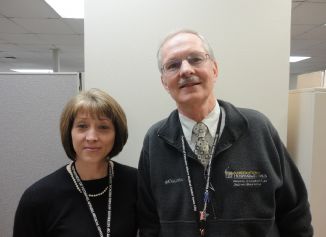

Doug Geraets, PharmD
Doug R. Geraets, PharmD, joined the Iowa City VA Health Care System in 1995. He is a Pharmacology Specialist serving patients through direct patient care and research. Dr. Geraets first became involved in research while pursuing his PharmD degree. He has continued to conduct research to contribute to the advancement of science and ultimately improve patient care.
Dr. Geraets has appreciated having the opportunity to work with ICVARF. He says the flexibility with research dollars and time really allows them to focus more on the actual research being completed. Dr. Geraets states,
“It’s very valuable to have someone like Sarah at the Foundation who has a strong understanding of the research process and is able to connect investigators with resources that promote successful studies.”
He credits Executive Director Sarah Else for connecting him with Clinical Research Coordinator Karie Mobley. Ms. Mobley has 12 years of research experience and enjoys being a part of science that is always changing. She has worked with Dr. Geraets for the last two years on a large scale research project referred to as the BRIDGE study and sponsored by Duke Clinical Research Institute.  Ms. Mobley says she enjoys working with the Veterans who so graciously give their time to participate. Dr. Geraets recognizes the crucial role of research coordinators such Ms. Mobley in navigating increasing compliance and regulatory hurdles. Through their team’s work, they have been able to continue successfully recruiting study participants. In February 2013, ICVAHCS was recognized as one of the top sites (of more than 95) for enrolling participants.
Ms. Mobley says she enjoys working with the Veterans who so graciously give their time to participate. Dr. Geraets recognizes the crucial role of research coordinators such Ms. Mobley in navigating increasing compliance and regulatory hurdles. Through their team’s work, they have been able to continue successfully recruiting study participants. In February 2013, ICVAHCS was recognized as one of the top sites (of more than 95) for enrolling participants.
Active Research
Bridging Anticoagulation in Patients who Require Temporary Interruption of Warfarin Therapy for an Elective Invasive Procedure or Surgery (BRIDGE)
If patients are taking blood thinners (anticoagulants) and require surgery or other medical procedures, there must be a modification made to their blood thinner medication because it can increase a patient’s risk for complications. Some doctors switch patients from their typical medication (warfarin) to a medication that has shorter effects (heparin) before and during the time of surgery. This is referred to as “bridging anticoagulation”. Some doctors simply stop patients’ blood thinner medication altogether until surgery is completed. There has never been a controlled study to determine which of these strategies is safest for patients.
There is uncertainty about the benefit or harm of bridging anticoagulation. This research study will determine the possible benefits and harms of bridging anticoagulation and will inform doctors about the best way to care for patients. Thus far 1302 patients of a planned 2526 patients have been enrolled in more than 95 sites in the US and Canada. Both Veteran and non-Veteran populations are being enrolled. Anticipated completion of the trial is now projected to be March 31, 2015
For more information about the BRIDGE study, please visit: https://bridge.dcri.duke.edu/
Impact on Veterans
There are many Veterans on blood thinner medications. Many of these Veterans may also require surgery or other medical procedures at some point. His hope is that his active research (and all his research studies) will advance science and lead to improved patient care. Specifically he hopes by participating in the BRIDGE study, ICVAHCS will contribute valuable information to Duke Clinical Research Institute and assist in determining the safest way to bridge patients off anticoagulants to prevent complications.



